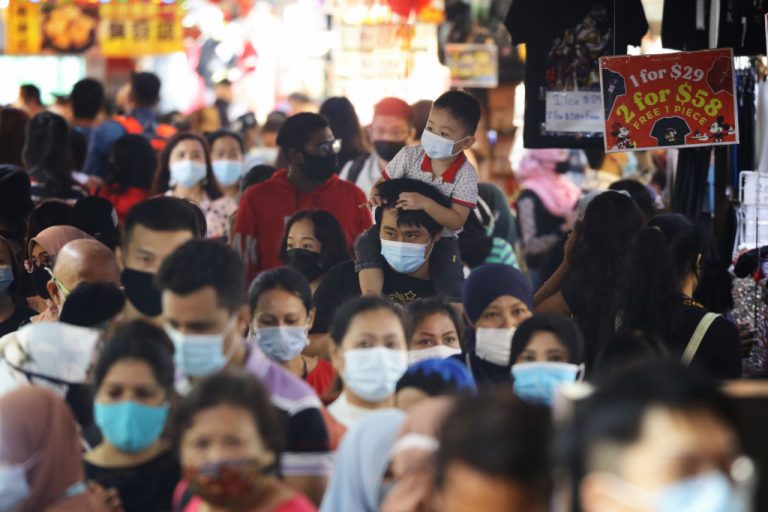The Singapore government’s warning that it would impose strict segregation measures on the unvaccinated population of Singapore has had an immediate impact in the country. The warning, issued last month, caused vaccination numbers to surge.
In just two weeks, the percentage of fully vaccinated people in the country jumped from 70 percent to 78 percent. Singapore is one of the leading countries in the world in terms of vaccination rates, however many unvaccinated Singaporeans have been pressured into getting a COVID-19 vaccination in order to avoid being ostracized from society.
Government measures, imposed on Aug. 10, banned unvaccinated people over the age of 13 from dining outside except from ‘hawker centers’, Singapore’s open-air food centers.
The unvaccinated are prohibited from attending gyms and fitness classes while Cinemas and shopping malls have implemented a form of vaccine passport.
As such, those who remain unvaccinated are being excluded from many parts of society. The only way an unvaccinated person is allowed entry to a restaurant is if they provide a negative COVID-19 test result; a test that can cost up to $48.
Success
You are now signed up for our newsletter
Success
Check your email to complete sign up
In an interview with the South China Morning Post (SCMP), a woman who identified herself as “Mrs. Ong” stated that she originally did not want to take the mRNA vaccines from Pfizer or Moderna due to concerns of possible adverse reactions. She was specifically concerned about myocarditis, an inflammation of the heart muscle that is said to be an adverse effect of COVID-19 vaccines.
But, the 38-year-old mother of two did not have much of a choice after the government announced strict measures against unvaccinated people. “I felt like a social outcast… So I reluctantly decided to get the vaccine so that I could have a sense of freedom again,” Ong said. She agreed to a Pfizer vaccination and reportedly suffered from nausea and headaches for two days.
Another Singaporean, going by the name “Mrs. Tan”, told SCMP that the main reason she avoided vaccination is because too little is known about how they might affect infants. Mrs. Tan is in her thirties and has a five-month-old child.
“There are no long-term studies on the effect of the mRNA technology on the human body, therefore I prefer to take my chances on my immune system and the different immune-boosting strategies I’ve been using for a while,” Tan said adding that unvaccinated people are discriminated against in Singapore.
She said she has been following a plant-based diet together with zinc, Vitamin C, and Vitamin D supplements.
People who suffer from chronic medical conditions have been put in a complicated position due to the government’s actions against unvaccinated people.
33-year-old Vanessa Chua avoided vaccination as she suffers from an autoimmune condition. After she took the first dose of Pfizer vaccine, Vanessa ended up in hospital for 10-days due to a rare reaction to the shot. Her immune response, triggered by the vaccine, was beginning to affect her bone marrow and liver. Doctors had to resort to a strong steroid treatment to bring down her body’s immune response.
Professor Paulin Straughan, a sociologist from Singapore Management University, points out that it is critical to cater to the needs of people who cannot be vaccinated for medical reasons. “For these, wherever possible, we should try to facilitate their inclusion, perhaps in smaller group settings. I am most concerned about seniors who cannot be vaccinated and their social isolation if they are not given access to social activities,” Paulin told The Straits Times.
Vaccines and employment
Though the Singapore government maintains that employers must not mandate COVID- 19 vaccines, it has announced that employees in selected sectors must get vaccinated or undergo regular COVID-19 testing under the Vaccinate or Regular Test (VoRT) initiative that comes into effect on Oct. 1.
Sectors that come under the VoRT regime include healthcare facilities, businesses that interact with customers in high-risk mask-off settings like personal care and gyms as well as businesses that interact frequently with the public like supermarkets and taxis and anyone working in the public service.
Some Singaporeans are preparing to quit their jobs if their employer imposes vaccine mandates, like Mrs. Lee, who has been working at her current job for 10 years.
“It’ll be unbearable if I have to pay for the tests regularly out of my own pocket. I don’t see why I should, when it should be the vaccinated workers who should be tested regularly because they may not show symptoms of having COVID-19 and hence pose a bigger threat,” Lee said to Today.
The administration’s drive to get as many people vaccinated comes as COVID-19 infections have been increasing in the country despite higher inoculation rates. Between July 1 and Sept. 15, the number of daily new confirmed COVID-19 cases per million people jumped from 1.70 to 136.86, an increase of 79 times. During this time, the share of people who received at least one dose of COVID-19 vaccine rose from 58.11 to 78.88 percent.
Singapore has also increased its contact tracing efforts in the face of surging cases.
In addition to the vaccine requirement that comes into effect on Oct. 1, the government has instructed businesses to put employees that test positive for COVID-19 into a work-from-home regime for 14 days. Even people who are considered clinically well are being isolated at facilities after testing positive.
In an interview with Reuters, Alex Cook, an infectious disease modeling expert at the National University of Singapore (NUS), said that placing restrictions on people in a society that has a high vaccination rate can have negative effects.
“Despite hitting a vaccine coverage of over 80% … and having very low numbers of severe cases as a result, [Singaporeans] are now being told that they need to go back to more restrictions again… There is a risk that such ambiguity could damage adherence to guidance in future,” Cook said.


















